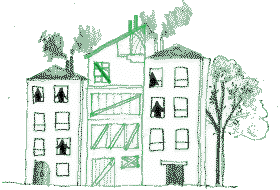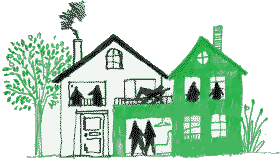“Nature in the city”, “green and blue grids”, “low carbon”, “bio-based building”, “low-impact modes of transport”…
Initiatives and strategies have proliferated but not always in ways that link up, form a coherent policy, and produce results.
And that shouldn’t come as a surprise: nobody is trained in urban ecology.
The TERRESTRIAL CITIES course outlines five pillars to help learners evaluate initiatives and distinguish between green washing and real change.

Who is this training for?

Do you want to better understand the challenges of urban ecology and be part of a profound change in the way we build cities?
This cross-disciplinary and operational course is intended for people who shape the city and daily lives of urbanites, starting directly from their needs.
Are you an urban planner, architect, researcher, or student? Do you feel as though you lack a sufficient background in urban ecology?
Are you an elected official in a local community? Do you want to implement sustainable initiatives that go beyond green washing?
Are you a public planner who wants to focus your work around respecting urban ecosystems?
Are you an urban dweller interested in better answering your kids when they ask, “What will the city of tomorrow look like”?
Rooted in the belief that our cities can and must become ecological, the TERRESTRIAL CITIES course shares theory-based tools and inspiring initiatives with people working to shape urban environments.
The TERRESTRIAL CITIES course includes a 60-page handbook and an educational game (available in five languages). All aspects of urban ecology are covered in the course so participants can imagine more vibrant, autonomous, and soothing urban environments.
People are talking about TERRESTRIAL CITIES
in the media and in books
“Urban ecology helps us root society back into the Earth.
LE MONDE, 2021
Read the article
“The prevailing idea is that we should ‘put nature back into the city’. You, on the other hand, speak of ‘putting the city back into nature’. What’s the difference?”
SOCIALTER, 2020
Read the article
“Urban farming is spreading in Marseille.”
Read the article
TÉLÉRAMA, 2022
“Changing our relationship to the soil in cities will change the basic tone of our urbanity. It will mean pedestrian cities, water, and gardens. Cities will literally be terrestrial and worthy of Adam, adama, or the terrestrial creatures that we are.”
Baptiste Lanaspeze, Ville sauvage, Actes Sud, 2020
See the book
“Reusing materials and working with people trying to integrate into society are part of the same mindset. An end to throwaway and exclusion culture. We’re done with consumption and taking more from Planet Earth. We want to use what we have.”
Philippe and Clara Simay, La Ferme du rail, Actes Sud, 2022
See the book
